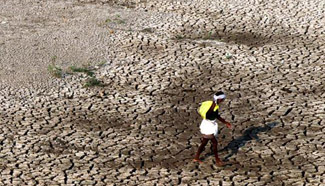CANBERRA, March 7 (Xinhua) -- Despite efforts to counter climate change in Australia, its impact on the local ecosystem may be "irreversible," the 2017 State of the Environment report has said.
The report, released by Environment Minister Josh Frydenberg on Tuesday, said while progress was being made in some key areas, the overall environment was "deteriorating" due to the impact of climate change.
The report stated that climate change would have wider-ranging effects on greater society if its effects were not reined in, and lamented the government for not having a "clear vision" for protecting some of the nation's most vulnerable areas between now and 2050.
"(Climate change) is altering the structure and function of natural ecosystems, and affecting heritage, economic activity and human well-being," the report said.
"Climate change will result in location-specific vulnerabilities, and people who are socially and economically disadvantaged are the most sensitive to climate change.
"Evidence shows that the impacts of climate change are increasing, and some of these impacts may be irreversible."
Federal Environment Minister, Josh Frydenberg said the report was a wake-up call for the government to do more to help protect Australia's natural ecosystems - and therefore flora and fauna.
"Like previous reports, this year's document has its bright spots while also indicating a number of areas where there is much more to do," Frydenberg wrote in The Guardian Australia on Tuesday.
"Good progress has been made in the management of the marine and Antarctic environments, natural and cultural heritage and the built environment, while pressures are building in relation to invasive species, climate change, land use and coastal protection.
"While carbon emissions per capita have declined from 24.1 tons in 2011 to 22.2 tons in 2015, and energy efficiency improvements are reducing electricity demand, the report makes clear that, for the world to meet its Paris goals, there is much more to do."
The minister said the government would continue to research ways to prevent climate change from affecting one of the nation's largest and most popular tourist attractions, the Great Barrier Reef.
"Climate change continues to be a major challenge and we've seen a major change in the Great Barrier Reef and climate change and the El Nino effect causes for that," Frydenberg said.
"We've seen a bleaching event last year in the Barrier Reef and we're concerned about further bleaching events."
Frydenberg added that another, often forgotten threat to the natural environment was that posed by invasive species, such as feral cats, rabbit and cane toads.
"We're also seeing some real challenges with invasive species and particularly feral cats that prey on marsupials and birds and reptiles, many of which are on the endangered list."












